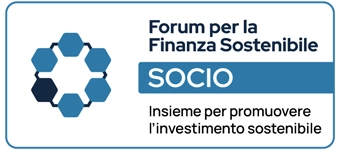Passa a
This page contains the guidelines adopted by the Ersel Group on environmental, social and governance (Environmental, Social and Governance, hereinafter also "ESG") sustainability.
Aware of the importance of playing an active role in the fight against climate change, Ersel adheres to the PRI through Ersel Asset Management SGR and Ersel Gestion Internationale. The PRI (Principles for Responsible Investments) are a United Nations initiative created to promote the integration of ESG principles in asset management and investment decisions and the development of a more sustainable global financial system.
Ersel also adheres to the Forum for Sustainable Finance.




Energy from renewable sources
Signing of certificates for the supply of energy from renewable sources

Choice of suppliers
Recycled paper, DHL with GoGreen, energy-saving printers

Green mobility
Upgrading hybrid and electric company cars

Attention to people
Welfare, training and counseling

Closeness to the community
Foundations, Covid donations, cultural events for the benefit of the city

University and research
Closeness to the world of university and research and collaborations with ISPI and Istituto Carlo Alberto, LTI
Our roadmap
The sustainability and the management of any activity according to the best practices of good governance are essential factors for the creation of value in the short but even more in the medium-long term. For this reason, Ersel takes great account of ESG factors in its work, in the concrete choices of each day, in business practices, in products, in the investments it promotes and in relations with the different categories of stakeholders.
E - Environment
We apply a policy that aims to reduce environmental impact, preferring suppliers that adopt high environmental and ethical standards and that ensure the chain of commerce socially responsible, choosing means of transport of the latest generation, installing energy-saving vending machines, reducing waste of resources. "Green" innovations have been introduced to encourage the reduction of the use of plastic and the separate collection, and more digitization in communications has been promoted also to reduce the use of paper. The Group has also undertaken policies of energy saving and promotion of sustainability with targeted interventions of renovation of buildings and renewal of plants and equipment, including an entire building at the Milan headquarters certified LEED Gold. This is one of the most prestigious international recognitions for sustainable construction, attesting to the adoption of design and management solutions aimed at reducing environmental impact, improving energy efficiency, and ensuring the well-being of people who live and work in these spaces.
S - Social
We strive to create a working environment in which people are able to follow their own attitudes and demonstrate their abilities. We are committed to attracting the best talents and enabling them to develop their potential, as well as creating conditions that meet the standards of personal dignity, human rights and equal opportunities, avoiding any kind of favouritism and facilitation. Training programmes to strengthen skills are of great importance. We are committed to ensuring the well-being of workers and to preserving the balance between private and working life through a substantial welfare programme and a counseling support.
The deep link with the territory and the awareness of corporate social responsibility are the principles that inspire our action in the field of culture. We have been protagonists of high-profile events in the field of art for years. A commitment confirmed by the presence among the founding members of the Teatro Regio, one of the most important Italian opera companies, by the collaboration with prestigious institutions such as the Unione Musicale, Galleria d’Arte Moderna and FAI and participation in the Consulta per la Valorizzazione dei Beni Artistici e Culturali of the city. We don't just contribute to events or events proposed by other institutions, but in many cases we intervene in the projects from their conception.
We cultivate long-term relationships with institutions and organizations that integrate into our strategy. The commitment in the field of art, especially figurative art and photography, with important exhibitions and previews auction, are accompanied by initiatives of a technical nature, conferences, meetings and important agreements with the university world and with prestigious institutions in the economic and financial field.
We have been active in the field of training for years with projects aimed at spreading economic-financial culture, such as with our Podcast series available on all major platforms. A podcast dedicated to sustainable investments is available at this link.
We have set up and actively support two Foundations, one aimed at supporting children and families in difficulty, the other at artistic promotion.
- Fondazione Paideia: one of the most active non-profit organizations in Piedmont to support children in difficulty, working to improve the living conditions of children and families living in situations of distress, promoting specific initiatives and encouraging the development of effective and innovative interventions.
- Fondazione Renzo Giubergia: helps and promotes young musical and artistic talents, using and enhancing places of particular beauty and architectural relevance.
G - Governance
We have set up a Sustainability Committee consisting of the first decision-making and business lines dedicated to the supervision of sustainability issues related to the exercise of the business and its dynamics of interaction with all stakeholders. In appointing the members of the collegiate bodies, we apply, among others, the principles of respect for independence and gender diversity.
Sustainable finance development
Ersel, always attentive to the issues of social responsibility, welcomed the path initiated by the European Union aimed at the development of sustainable finance through a harmonised regulatory framework. Considerations on governance, environmental and social aspects are an integral part of the Group’s investment selection process and are described in the following communication.
Communication pursuant to Art. 3, 4, 5 of Regulation 2088/2019 (SFDR)
Introduction and definitions
The Regulation (EU) 2019/2088 of the European Parliament and of the Council of 27 November 2019, relating to the disclosure on sustainability in the financial services sector (hereinafter, SFDR), was adopted in November 2019 and amended in June 2020 with the adoption of Regulation (EU) 852/2020 (the so-called Taxonomy of eco-sustainable activities). The SFDR, which is set within the context of the European Union Action Plan for Sustainable Finance,™ requires investment fund managers (“IFM”) of undertakings for collective investment in transferable securities and alternative investment funds (“AIFM”) to comply with harmonised rules on transparency with regard to sustainability risks and the consideration of adverse sustainability impacts and the provision of sustainability-related information. In particular, the SFDR introduces the specific disclosure obligations listed hereinafter:
- information about the policies on the integration of sustainability risks adopted by the IFM in their decision-making processes relating to investments and in the provision of the advisory service (Article 3 SFDR);
- information whether the IFM takes into account or does not take into consideration the main negative effects of investment decisions on sustainability factors (art. 4 SFDR);
- information on how the remuneration policy of the IFM is consistent with the integration of sustainability risk (Article 5 SFDR).
Some definitions useful for understanding the aforementioned communication are provided below.
- Sustainability risk: an environmental, social or governance event or condition which, if it occurs, could cause a significant actual or potential negative impact on the value of the investment;
- Sustainable investment: investment in an economic activity that contributes to an environmental objective, measured, for example, by key resource efficiency indicators concerning the use of energy, the use of renewable energies, the use of raw materials and water resources and land use, waste generation, greenhouse gas emissions as well as the impact on biodiversity and the circular economy or an investment in an economic activity that contributes to a social objective, in particular an investment that contributes to the fight against inequality, or which promotes social cohesion, social integration and industrial relations, or an investment in human capital or in economically or socially disadvantaged communities provided that such investments do not cause significant damage to any of those objectives and that the companies benefiting from such investments comply with good governance practices, in particular with regard to solid management, staff relations, staff remuneration and compliance with tax obligations.
- ESG: Enviromental, Social, Governance.
Art. 3 Transparency of sustainability risk policies
The Ersel Group has always been attentive to environmental and social issues, the evolution of technical and scientific research in every area of activity. In this context, compliance with the principles of environmental, social and governance sustainability, together with the values that have always been supported by the Group throughout its history and already referred to in the Code of Ethics, are essential.
The factors on which the Ersel Group bases its sustainable commitment are:
- Environment: the Group promotes and supports a culture of enhancement and respect for the environment through policies aimed at reducing environmental impact such as reducing the use of plastics, preferring suppliers who adopt environmental and ethical standards and who guarantee the socially responsible supply chain.
- Social: the Group has been involved for over twenty years in the social field through the Paideia Foundation which works every day alongside families and children in difficulty, promoting effective and innovative projects, ensuring the creation of contexts that are attentive and respectful of the needs of smaller. The Group also adopts welfare policies for all company personnel belonging to the Group.
- Governance: the Group has adopted a specific Governance structure aimed at managing and monitoring ESG issues. The corporate functions responsible for the supervision and management of ESG issues are:
a. Board of Directors: approves the ESG policy and supervises the sustainability aspects thanks to the support of the Sustainability Committee (hereinafter also the "ESG Committee")
b. ESG Committee: it is a committee with advisory and propositional functions. It is dedicated to the supervision of sustainability issues related to the company's business and its interaction dynamics with all stakeholders. With reference to ESG issues, it is not limited to carrying out an exclusively evaluative and advisory function in favor of the Board, but also has a propositional and investigative role, helping to ensure better monitoring of ESG risks.
c. Investment Committee: makes appropriate investment choices taking into account the guidelines and indications provided by the ESG Committee.
d. Risk management: periodically and continuously, compliance with ESG policies of the investments made.
The integration of ESG criteria into the investment strategy can in fact generate sustainable profits over time and, consequently, a solid prospect of creating value for all stakeholders. This also allows for more efficient management of financial, environmental and social risks, which can negatively affect the value creation of individual investments. Therefore, identifying and managing environmental, social and governance risks is part of the fiduciary duty to protect the value of investors' assets.
On this basis, the Group intends to integrate non-financial considerations into its product governance and investment process, which aim to generate added social and environmental value, through the integration of risks and sustainability factors, in the assessment and selection of investment opportunities.
The Group has decided to adopt specific tools aimed at defining the relevance of sustainability risks within the investment decision-making processes.
These tools are identified in:
- a system for assessing and measuring sustainability risks
- a Due Diligence process for the definition of target investments based on the different types of product, investment and characteristics of the underlying and an approach and guidelines for assessing the risks to be applied to the different types of investment.
The Group maintains a proactive approach in reviewing internal policies relating to the integration of ESG risks into investment processes, and to assessing and monitoring their impact on product returns.Therefore, the information on the website in this area will be updated on an ongoing basis and in a manner consistent with the updates of internal policies.
Art. 4 Transparency of Adverse Sustainability Impacts
No consideration of adverse impacts of investment decisions on sustainability factorsIn accordance with Article 4 of Regulation (EU) 2019/2088 ("SFDR") on sustainability disclosures in the financial services sector, Ersel Gestion Internationale has opted for an "explain" approach with regard to the consideration of principal adverse impacts of its investment decisions on sustainability factors. The current decision not to consider PAI factors derives from the Company's desire to align with market best practices, which provide for analyses based on a consistent database, with a historical record that allows for the reliability of analyses over time. This would enable an effective and efficient application of the related monitoring activities.
However, the Company maintains a proactive stance in identifying indicators and metrics to assess the potential adverse impacts of investment decisions on sustainability factors, evaluating annually the possibility of adopting a "comply" approach. In this perspective, the Company has decided to begin a process to collect and monitor specific indicators defined in the Delegated Regulation (EU) 2022/1288 (Annex I), which have been appropriately identified within the funds currently classified under the SFDR.
The website disclosures required by Article 10 of the SFDR are available under the “Documents/Sustainability-related disclosures-Article 8” sections of the certain Article 8 subfunds
Art. 5 Transparency of remuneration policies in relation to the integration of sustainability risks
This declaration applies to all companies of the Ersel Group (hereinafter "the Group"). In line with the provisions of article 5 of the 2019/2088 European Regulation, the Group has taken steps to integrate the appropriate sustainability considerations not only in the related investment decisions, but also as a fundamental component of the remuneration systems, with the objective of encouraging the commitment and engagement of personnel in favor of sustainability issues. With this in mind, the Group has taken steps to integrate its remuneration policies with appropriate assessment systems for Top Management and key personnel, which take into account the pursuit of results and performance oriented towards compliance with environmental, social and governance factors . For further details, please refer to the policies available on the Group's website in the "policies and regulations" section of our IT website.
The Policies and Regulations of the Ersel Group on environmental, social and governance (ESG - Environmental, Social and Governance) are available on this page.
| Document | Date of the document | Language | Download |
| Sustainability Policy ESG | 15/05/2025 | English | PDF get_app |
| Regulations of the Sustainability Committee and ESG Working Group | 15/05/2025 | English | PDF get_app |
| Responsible Investment ESG Policy | 29/07/2025 | English | PDF get_app |
| Engagement and Voting Rights Policy ESG | 01/08/2025 | English | PDF get_app |
| Good Governance Practices | 27/03/2024 | English | PDF get_app |
| Guidelines for the ESG Working Group | 28/09/2023 | Italian | PDF get_app |
| Double Materiality Assessment | 23/04/2024 | English | PDF get_app |
This page contains the RTS Pre-contractual Disclosures of the ESG Funds of Ersel Asset Management SpA and Ersel Gestione Internationale SA.
| Document | Date of the document | Language | Download |
| Leadersel Corporate Bond - Pre-contractual disclosure information RTS | 15/05/2025 | English | PDF get_app |
| Leadersel Corporate Bond - Periodic Disclosure RTS | 15/05/2025 | English | PDF get_app |
| Ersel Real Estate Fund - Pre-contractual disclosure information RTS | 04/06/2025 | English | PDF get_app |
| Ersel Real Estate Fund - Periodic Disclosure RTS | 04/06/2025 | English | PDF get_app |
| Long Term Income - Pre-contractual disclosure information RTS | 04/06/2025 | English | PDF get_app |
| Long Term Income - Periodic Disclosure RTS | 23/05/2025 | English | PDF get_app |
| Leadersel Innotech - Pre-contractual disclosure information RTS | 15/04/2025 | English | PDF get_app |
| Leadersel Innotech - Periodic Disclosure RTS | 15/05/2025 | English | PDF get_app |
| Leadersel Financial Bonds - Pre-contractual disclosure information RTS | 15/04/2025 | English | PDF get_app |
Reports on voting activities are available on this page.
| Document | Date of the document | Language | Download |
| Voting Activity Report 2024 | 27/03/2025 | English | PDF get_app |
| Report on the implementation of the Engagement Policy | 29/07/2025 | English | PDF get_app |
